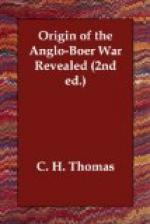He is expert in finding and following any trail, and can promptly tell the imprint from whatever animal it might be, or of whatever human origin; an ideal scout and unsurpassed as a pioneer. When travelling over roadless country the Boer’s instinct will direct him in tracing the most practicable route for his wagons, and with his experience he can foretell what kind of topography he will in succession have to traverse, avoiding unnegotiable spots and unnecessary detours, and when about to halt, a surveying gaze will locate the safest and most suitable position for his temporary camp. Such capacities serve with obvious advantage in defensive and offensive war tactics. Prompt in seizing an advantage and in avoiding danger, he has also learnt to be an adept in ruses to decoy and mislead an enemy, and as for self-help and resourcefulness, there is hardly a situation or difficulty conceivable which will not be successfully surmounted. The usual Boer can also fend for himself and cope with the minor perplexities of every-day life in the field, which would strand a less initiated man. He can cook, bake bread, mend clothes, make boots, repair saddles, harness, and vehicles, and is full of expedients and able to make shift. Most of them know how to shoe their horses, whilst many of them are expert also in working wood and metals and similar handicrafts. In short, the Boers make ideal scouts and are unique as colonizing pioneers. In their nomadic wanderings and frequent wars, the Boers have gained much useful experience in tactics, strategy, and in the wiles of diplomacy too. They also learnt to adopt methods of organization, of cohesion, combined action, and a certain amount of discipline among themselves.
They elect as subordinate and chief leaders men whose abilities and influence have commended them for such responsible appointments. Before committing themselves to any very important step these leaders would first confer with the people, who in turn would generally be easily swayed to their opinions, and who found by experience that it was safest to follow their judgment. It thus also became a habit to leave the main thinking over to those leaders, which enhanced unanimity and led to a self-imposed obedience and discipline recognised as necessary for the common welfare and also indispensable for common safety.
So prevalent had the practice become of deferring to the opinions of their leaders that it engendered an apathy among the people against considering political and public matters which were not altogether of engrossing importance. Public meetings would be poorly attended, and at elections not half the votes were recorded. “Let the elected heads see to it; they are paid for doing the controlling and thinking work”—that used to be the general feeling. But during the past twenty years public interest has by degrees been successfully aroused by the activities of the Afrikaner Bond; the former apathy and distaste to the consideration of public concerns have given place to a more lively identification even with politics, but the tendency of being swayed by men of influence of their own kind remains unchanged.




